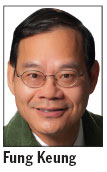Stick to journalistic ethics
Updated: 2013-02-19 05:59
By Fung Keung(HK Edition)
|
|||||||
When I read an English-language daily newspaper on Feb 8, I found, to my dismay, all six people quoted in an article criticizing Chief Executive Leung Chun-ying for issuing a lawyer's letter to Hong Kong Economic Journal (HKEJ) for defamation and demanding a retraction.
I beg to differ.
The six are well-known legal and journalism professors at the University of Hong Kong, City University of Hong Kong and Hong Kong Baptist University, and opposition legislators. Their political-correct stance should surprise nobody. My job is to train young people to become journalists in Hong Kong and it's painful and disappointing for me to read what they have said.
Hong Kong's defamation law says that "any person who publishes defamatory matters regarding another person or an organization in writing or by word of mouth or by conduct may be liable for defamation." Arguing that "somebody else said it and I didn't" is absolutely no defense in court. We are liable if we repeat a defamatory statement. Before we print anything, we should verify it with sources. If we can't substantiate an allegation, we should not publish it. This is a principle I have adhered to in my 20-odd years as a journalist.
We teach journalism students that "when in doubt, leave it out". Repeating a libelous statement is liable to prosecution. The newspaper article concerned clearly implied that Leung has triad links. The writer had based his conclusion on comments made by a social figure who had political motives in saying what he had said. But it's a mistake for anyone to reiterate the accusation without verification.

This is so-called "journalism 101" (basic journalistic knowledge) and we should not mislead our young people, and journalism students in particular, that it is OK to attack or badmouth a government official or political figures because he or she holds public office. The defamation law applies to anyone, notwithstanding his/her status as a public or private figure.
Commentators accused Leung of suppressing press freedom in Hong Kong by threatening to sue HKEJ. Their accusations, I'm afraid, are misguided. What Leung said was: "I have all along respected freedom of speech and freedom of the press. Nevertheless, the article contains serious allegations which accused me of having links with a triad society. The matter has to be taken seriously."
I utterly agree with Leung. We can't argue that because he is the Chief Executive, he should abdicate his rights to defend his reputation. By the same token, if journalists or newspapers are libeled or slandered, they are protected under the laws of Hong Kong. It doesn't make sense if we want the defamatory law only to protect us and not the Chief Executive. We can attack his policies or untoward behavior, but defaming or ruining his reputation is something else.
The case appears to have been put to rest with HKEJ issuing an apology on Feb 8. "We apologize if the article prompted some readers to make unfair conclusions about Mr Leung and had caused him any inconvenience," the newspaper said. However, HKEJ insisted that the apology was aimed only at its readers and not Leung and would not retract the story. In reality, it doesn't really matter. An apology is an apology. Leung should be satisfied and he should let sleeping dogs lie.
Political correctness is nothing wrong. But it's more important for us conscientious educators, and it's also our duty to tell young people what is right and wrong. We should be brave in admitting mistakes and not send a wrong message to young journalists.
The author is the coordinator of the B.S.Sc in financial journalism program at Hong Kong Baptist University.
(HK Edition 02/19/2013 page1)